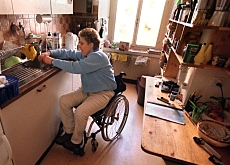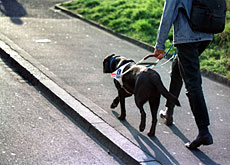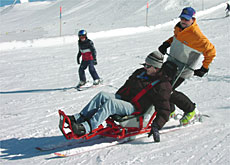New project empowers disabled people

A pilot project is helping disabled people to become employers – participants receive a grant to pay for a carer, whom they are free to choose.
The two-year-scheme, which started in January, will enable 400 people, including children, to live at home and will not dictate who can be a carer and how much they should be paid.
The programme has SFr43 million ($33.8 million) at its disposal, which will be provided by the state from the invalidity benefit system.
Its main aims are to give the power of self-determination to the severely disabled by financing their personal choice of carer and to gather data in support of the general introduction of such a service.
Another goal is to get people out of registered homes and to reduce the spiralling costs of professional care.
The state invalidity system currently picks up 40 per cent of the costs of living in a home. In 2004 this amounted to SFr1.2 billion.
The cantons, home residents, communes and health insurance meet the remaining 60 per cent.
The new scheme would enable family members, who are often not remunerated for the time spent caring for disabled relatives, to be paid for their services.
Uncommon
Katharina Kanka, president of the foundation overseeing the pilot project, told swissinfo that the concept of home carers was not so widespread in Switzerland and that the country trailed behind the rest of Europe.
The system of institutional care in Switzerland, which is well financed and of high quality, has also contributed to the apparent failure of this model to take root, she said.
“In contrast, there is no money for integration [of the disabled into mainstream society] and a beautiful island has been created, which doesn’t leave any room for people who want to live on their own,” said Kanka.
Another barrier comes from the service providers themselves, for whom looking after the handicapped is a big business, she added.
Children
The 400 participants have been drawn from all ages and disabilities.
Some of the children taking part will be able to lead a normal life away from institutions.
“Some visit special schools but they want to go to regular schools with a carer. Those taking part in the project will stay at home and will be able to enjoy a normal family life,” Kanka said.
Adults may have been institutionalised for years and wish to become independent, she added. Others are dependent on family members who juggle work with care commitments without a break or pay.
The programme sets no restrictions on whom a participant may employ as a carer and such people would not necessarily need to hold any healthcare qualifications.
It would also not dictate how much carers should be paid.
Cash stricken
The organisers envisage that SFr30 per hour would be paid to helpers. A participant would receive, on average, SFr50,000 a year.
In contrast, the estimated annual costs of being cared for in a home are SFr110,000 per person or SFr300 a day.
Once the project starts, it is estimated that annual savings could total SFr30 million.
The trial comes as the state invalidity benefit scheme is in a dire financial situation. In 2004 it ran up debts of more than SFr6 billion and it posted a record deficit of SFr1.2 billion in the first half of 2005.
Nearly two years ago voters rejected a government proposal to increase Value Added Tax by a percentage point to plug the hole.
The authorities are now focusing their efforts on spending cuts in a bid to bolster the finances of the social security system.
swissinfo, Faryal Mirza
100 people are expected to leave a home or avoid being put into one as a result of the project. This could lead to annual savings of SFr30 million.
Of the 33,000 people on the benefit that qualifies for the scheme, 6,000 are minors.
50% of the total live in registered homes and 25% are classified as severely disabled.
Participation in the scheme is restricted to people on a certain type of disability benefit.
This is for those who require the help of a third party to conduct their daily lives and require personal supervision.
The amount paid out depends on the degree of disability and whether the person lives in a home or at home.
Minors requiring extra care may receive an extra payment if they live at home.

In compliance with the JTI standards
More: SWI swissinfo.ch certified by the Journalism Trust Initiative


You can find an overview of ongoing debates with our journalists here . Please join us!
If you want to start a conversation about a topic raised in this article or want to report factual errors, email us at english@swissinfo.ch.